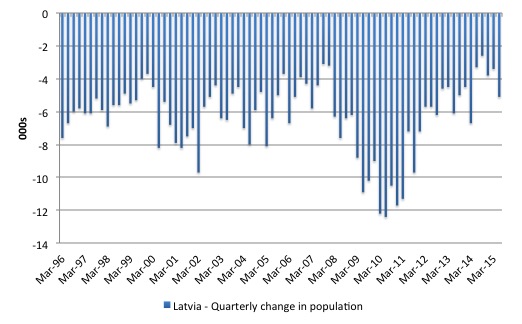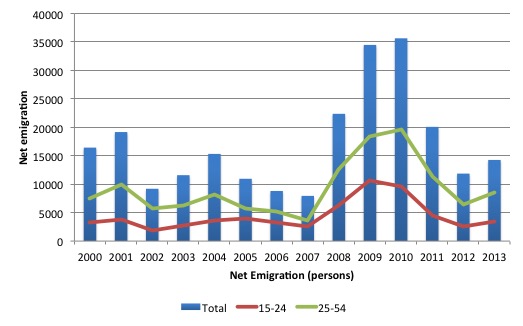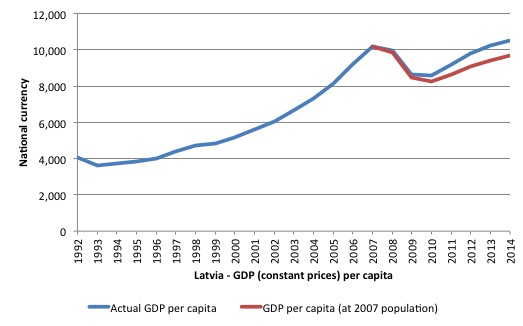The other day I was asked whether I was happy that the US President was…
Friday lay day – Latvia, the miracle of 10 per cent population shrinkage
Its my Friday lay day blog. I try to devote the major part of Fridays to writing other things (some book projects I am working on and some journal articles and other things). That is the logic of the lay day. I cut the time I devote to the blog in half (down to around 1 hour) in recognition of that logic. Today, I was examining the recent population data from Latvia to see what the latest trends were. Most countries would not judge success by the number of its population that leaves, especially when the departing souls are among the young and talented. But the so-called Latvian ‘miracle’ does just that. When the Latvian government aided and abetted by the IMF and the EU stooges imposed the harshest austerity of all on the people and real GDP growth followed, the neo-liberals were beside themselves with joy. Austerity works they screamed. Well not for the 10 per cent of the population who left. And now, the peak of the ‘miracle’ appears to be over as growth slows and the residual of a privatised, socially damaged society remains. I wouldn’t be holding out this little nation as a success story. More like a disaster if the reality is to be correctly appraised.
The American journalist Andrew Higgins wrote in the New York Times (January 1, 2013) article – Used to Hardship, Latvia Accepts Austerity, and Its Pain Eases – that Latvia had become the poster child for those who advocated the “healing properties of deep budget cuts”.
Christine Lagarde visited Riga in late 2012 and announced that the IMF was:
… proud to have been part of Latvia’s success story
Earlier, Andrew Higgins told us in a Wall Street Journal article (December 1, 2008) – How to Combat a Banking Crisis: First, Round Up the Pessimists – that it doesn’t pay to criticise the neo-liberal Groupthink in Latvia.
He wrote:
Hammered by economic woe, this former Soviet republic recently took a novel step to contain the crisis. Its counterespionage agency busted an economist for being too downbeat … Investigators suspect him of spreading “untruthful information.” They’ve ordered him not to leave the country and seized his computer.
There were many examples of the secret police detaining people for expressing concern about the situation within Latvia.
The Finance Minister spokesperson said of the vigilance by the Secret Police:
It is a form of deterrence.
Another commentator said that “It is regarded as unpatriotic to criticize”.
Well some might have been ordered by the secret police “not to leave the country” but a substantial portion of the population has certainly not heeded that advice.
Here is the quarterly change in the Latvian population estimates from the first quarter 1995 to the first-quarter 2015. At the worst part of the crisis, the nation was losing more than 12 thousand people every three months.
Since March 2007, Latvia’s population has shrunk by 10.2 per cent.
The following graph shows the Net Emigration (difference between Emigration and Immigration) for the period 2000 to 2013, decomposed into Total, 15-24 year olds, and the Prime-age 25-54 year olds.
The data shows that substantial proportions of the population left the country during the crisis years and while the rate of net exit has declined from the peak years, there were still more Latvians in the prime working ages who didn’t want to be part of the ‘miracle’ than persons who wanted to enter the country.
Despite three years of growth (2011, 2012 and 2013) above 4 per cent after the collapse in 2009, the recent growth rate is slowing (down to 1.9 per cent in the fourth-quarter 2014) and unemployment remains well above the 2008 level (10.8 per cent in 2014 compared to 7.5 per cent in 2008).
Real GDP is also still below its 2008 level. The proponents of the miracle thesis like to point out that GDP per capita is now above the pre-crisis levels.
But if you calculate GDP per capita based on the 2007 population, then the following graph tells you that it would still be well below the 2007 levels.
The data also shows that the “export miracle” was short-lived. Export growth was strong in 2010 and 2011 as wages tumbled but that growth has all but disappeared now. The external account is now back in deficit (draining growth) and the future does not look miraculous.
One of the reasons that export revenue was so high during the so-called ‘miracle recovery’ was that the “Foreign deposits benefit Latvia, boosting GDP through financial-services exports as well as increased economic activity as clients buy local property and use amenities,”
Further, the export growth was also related to the abuse of Latvia’s native forests.
While Russia has all but stripped itself of its old growth native forests, Latvia is not far behind. Latvia is heavily forested.
As the reality of the GFC dawned on the Latvian government, it “accepted a new plan for the nation’s forests, which has resulted in logging rates many scientists say are clearly unsustainable” (Source).
The Illegal Logging Portal notes that:
Following the economic crisis, Latvia sacrificed its forests through dubious math … new harvesting rates were pushed through the Latvian government without scientific input … the changes in forestry has resulted in a situation that is clearly unsustainable in the long-term with an ultimate collapse of the industry if changes aren’t made.
It is also known that the scientists used by the government to produce ‘optimistic’ outlooks for the forestry industry are “to a large extent dependent on LVM for grants” – LVM is “the state-owned timber giant, Latvijas Valsts mei”.
Talk about caring for the nation’s grandchildren!
Music – Bill Callahan
One of my favourite musicians, Bill Callahan (Smog) is coming to Australia and I have tickets to see him at the Sydney Opera House in a few weeks.
I was listening to him this morning while working.
Here is is singing Jim Cain, which appeared on his 2009 record – I wish we were an Eagle.
Reflective.
First Dog on the Moon – Fiscal Commentary
With the madness associated with the build-up to next week’s fiscal statement from the Australian Treasurer, First Dog on the Moon got in early with his assessment – The 2015 Budget is going viral.
About as stupid as the real thing but then the cartoon is funny the real thing will cause further unemployment and is evil.
British election
It is too early to know what will finally happen in the British election but the news as I write tells me two things, which I think will be borne out by the evidence once it is fully revealed.
1. The Liberal Democrats are being punished for abandoning their values and voters and going into coalition with the Tories. That verdict would be thoroughly deserved.
2. The Labour Party are being punished, particularly in Scotland, for being a Soft Touch Tory Party, given their embrace of the neo-liberal fiscal deficit cutting agenda. The Scottish outcome is also likely to demonstrate the continued separatist sentiment there. Key Labour politicians in Scotland look like being ousted.
Saturday Quiz
The Saturday Quiz will be back again tomorrow. It will be of an appropriate order of difficulty (-:
That is enough for today!
(c) Copyright 2015 Bill Mitchell. All Rights Reserved.




Michael Hudson has been consistently excellent and spot-on with his assessment of the neoliberal ‘medicine’ administered to Latvia.
Regarding the UK election, it’s evident that the UK Labour Party needed to be more like the SNP and less like a paler shade of the Tories. I somehow doubt they’ll heed that lesson sadly and the warmongering Blairites will reassert their dominance in the aftermath.
I hope you are planning for some UK oriented blogs next week, election and beyond. Im surprised and, for the first time in my lifetime, particularly dissapointed with the outcome, in terms of tory seats. As a public sector worker in the north of england, my personal future just darkened a little.
The results have left me reeling
Dear Bill
It seems that Latvia already had high net emigration before 2008, although not quite as high as afterwards. I wonder how many emigrants in the 1990’s were Russians who didn’t want to be part of a minority in the newly independent Latvia.
The British system of representation, which we also have in Canada, can produce a huge discrepancy between the distribution of votes and the distribution of seats. The Liberal Democrats lost most of their seats, but it is quite possible that their share of the votes cast decreased only marginally. The difference between the UKIP and Liberal Democrats on the one hand and the Scottish National Party on the other hand is that the support of the former is more or less evenly spread throughout the country while support for the latter is regionally concentrated. Under the British system, it doesn’t only matter how many votes you get but also where you get them. The final results aren’t in yet, but I wouldn’t be surprised if the Tories get another majority of the seats with about 40% of the votes, just as Thatcher used to do.
Regards. James
Hey Bill, I’m just wondering if you’ve forgotten about the quiz this week? It’s later than usual!
My Saturday isn’t quite the same without it 🙂
Latvia is also fiddling with their demographics’ statistics, things like a person that moved abroad comes for a visit and counts as resident of Latvia. It’s been hard core neoliberal politics from the beginning in Latvia after Soviet, Before EU membership they open their borders for subsidized (EU) surplus food on the word market devastating their own farming. Got free from the Soviet tyranny and immediately sold out to foreign financial masters.
Women have average lifespan of 78 while men only 69. By birth there is a surplus of men but by 30 there start to be a surplus of women. Native Latvian population have been shrinking since 1989, birthrate is low. Worst
safety in EU, many accidents and deaths. Men have high suicide rate.
A neoliberal success country, a place where people don’t want to have children and get away from ASAP.
But despite this the politics is fiercely nationalistic (anti russian), and run neoliberal economic policies that is literally making Latvia a country without a people.
Me thinks Bill continues to have problems grasping the new scale of the capitalistic system.
Latvia is the outer hinterland of the current European experiment.
People are forced to move in search of purchasing power
Displacement of populations happened in capitalistic nation states such as France in the 19th century.
The Ariege area is a classic example of village based stock moving in search of purchasing power which became centralized in Paris for no particular reason other then the dynamics of usury.. ( also a large % of men never came back from the trenches)
Now the area has one of the largest % covering of beech woodland in western Europe up to altitude of 1400 ~
Farms , villages and mines are now covered in a mat of 100 year old beech litter.
Soil erosion has been reversed but these ancient cultures are no more…….
PS – the typical dark British pine plantations ( American sitka spruce etc) were made worthless overnight after 1990 and the opening up of Soviet resources.
Long or even medium term land management is impossible under the influence of this capitalistic flux we know as modernity.
The catastrophic forestry policy of Ireland using fast growing Sitka Spruce ( they call it the pump when used on bogs) is par for the course.
Dear petermartin2001 (at 2015/05/09 at 14:47)
Thanks for the comment. The automatic updater encountered a glitch and so the quiz didn’t appear. I am glad you like it otherwise I wouldn’t have noticed until later.
It is now available.
best wishes
bill
I am sorry I cannot agree with using a so-called “progressive narrative” and forgetting about the real historic context. This doesn’t help much if someone is seeking the truth.
The migration of (mostly) ethnic Russians was exactly what the ethnic Latvian majority and politicians were trying to achieve – the real cost (austerity) didn’t seem to be too high. The objective was to undo the colonisation which mostly occurred under Stalin (but some areas were inhabited by Russians even earlier – Latvia was under Russian rule since 1710/1772.)
From Wikipedia:
“Between 136,000 and 190,000 Latvians, depending on the sources, were imprisoned, repressed or deported to Soviet concentration camps (the Gulag) in the post war years, from 1945 to 1952”
“By 1959 about 400,000 people arrived from other Soviet republics and the ethnic Latvian population had fallen to 62%”
” today there are 290,660 non-citizens in Latvia, which represent 14.1% of population”
I also suggest having a look at the graph depicting the evolution of the number of inhabitants belonging to various ethnic groups on the same Wikipedia page before we judge austerity as a failure. Yes there was some leakage of the Latvians but the exodus of the Russians was far greater – because they are socially and economically discriminated against.
I may call it economic ethnic cleansing in white gloves but wouldn’t say that the society was much further “damaged” by this process. The ethnic Latvians (the majority in their own society) have consciously chosen to inflict the “damage”. Was this morally wrong? Perhaps but this was their democratic choice. The Latvian society was actually mostly damaged by Joseph Stalin. Privatisation? What’s wrong about that? They wanted to root out all the remains of the communist system – they hated it like in Poland but much more. They sold the assets to the foreigners hoping that the new owners would defend them. Now they have American troops (not too many) stationing there. It is their country and they are allowed to do what they want – the majority (of the people having voting rights) approved the changes. Obviously Mr Putin has a different view and he is threatening again all the Baltic states with his army. Again – I am not declaring the moral winner in this contest. The military winner will be declared when the nuclear dust settles – hopefully not.
If someone speaks against the right of Israel to not allow the descendants of the Arabs who left in 1947-48 to come back – because supposedly the land in Israel still should legally belong to the Arabs – using the same logic the person should upheld the rights of the Latvians to reclaim their land because they inhabited it before 1940. The only difference is that the Latvians are now in power in their own country and can actually do what they want (to some extent) while the Palestinians are in refugee camps.
(For the record I fully support the Israelis, wishing they could find a peaceful solution which may or may not include the right of return – but this is another issue).
I am also obviously not defending these Latvians who joined Arajs Kommando and murdered Jews during WW2. A bit of fresh air in Siberia was exactly what they deserved. There is currently a whitewash of the role played by the Latvian Waffen SS members during WW2. Why am I writing all of this? Because of the oversimplification in the main blog article. There are “bad” austerians and “good” people who suffer. There is neoliberal propaganda which is based on lies that austerity “worked”. Well but there is also the historic context and economics without that context is just raw numbers – statistics and accounting. It is actually the fact that when neoliberal propaganda is met with progressive propaganda a lot of people are turned away. There is a lot of people who don’t care about “progressivism” or “being left-wing”. They actually may seek the truth whatever it means. Sounds too “liberal”? I am sorry I am not a Marxist.
The only point I am trying to make is that to talk about the economy and draw far-reaching political conclusions ignoring at the same time the fundamentally relevant historic background is not going to convince or enlighten anyone who was unlucky to be born not far away from that part of the world. I am not defending austerity which brought about hardship but in this case the tool was chosen not by a mistake. We can talk about the macroeconomic implications. But using this particular example without pointing at the relevant historic context even at the most elementary level (quoting a few sentences from Wikipedia would suffice) – and then drawing quite debatable political conclusions is in my opinion simply not right.
I have very little personal sympathy to the nationalistic Latvians and equally to Mr Putin and his Great-Russians. We can debate whether someone who was born in Riga in 1980 and speaks Russian should have automatic rights to Latvian citizenship or whether Latvians proud of their ancestors who fought against Soviet Union in Waffen SS are offending the memory of the victims of the Nazi genocide (Jews and other groups). I would say that “I honestly don’t know” and “yes”. But this is just my personal view. We have to present relevant facts (that Latvia is still struggling with the long-term effects of the Soviet occupation, communism and Russian colonisation) and anyone should make his/her own judgement…
And I have an awful feeling that the deep thinkers in the Labour party will put their failure down to Ed being too Red. Sometimes I think we made a big mistake coming down from the trees.
regarding the uk election I am afraid it is not as simple as labour were not left enough.
It is true that there was a massive swing in Scotland to a party slightly to the left of labour
on some issues but of course they fell into the hardly progressive arms of nationalism.
The bald fact is the last time labour won power with a leader vaguely left (Harold Wilson)
was 1974 .Yes 41 years ago!
Of course I think the electorate are mistaken but the majority of them have for a long
period of time perceived that their personal financial health is best served by the Tories.
Shy Tories are want to tell pollsters what they think is best for the broader community,
when they arrive at the polling stations their own false perceptions of their own
interests take over.
This may not be an international trend although any democratic victory for non progressive
parties seems to point to the fact that ordinary people perceive their economic interests
are best served by the right even as the right have embraced macro economic strategies which
make this less and less true.
Bill often makes light of some radical objections to some of MMT policy positions by dismissing
them as irrelevant idealistic marginal coffee shop musings with no traction in real politic .
A little self reflection and honesty and MMTiers are drinking at the next table.
What can be done about this depressing state of affairs?
The central political debate to win is if course to convince people that the state can
and does create money.That this is for the benefit of its citizens.Pushing the private
sector surplus argument for all its worth.To gain votes we must provide policies
that use state monetary power to advance the economic health of enough people
not just the unemployed.
The corruption of wealth and power is pervasive.We can rail against this all we like.
It’s capture of the media .Its capture of the macroeconomic policies of ‘progressive’
political parties.Its ability to turn its own financial crisis into an opportunity to increase
it’s power(Caught with its pants down shafting the mugs ,instead of being forced to stop
it just does away with the lube and asks us to knuckle down to the new austerity shafting)
but what can we do about it?
The Tories have won a small absolute majority on 37% of the vote. Labour got just over 30%, and the Lib Dems 8% so lost about 2/3rds of their vote and 49 out of 57 MPs.
However, I am not sure that can be put down to punishment for going into coalition with the Tories. The Labour vote only went up by 1.5%, and it seems as much or more of the Lib Dem vote went to the Tories as went to Labour. I think the general expectation was that Labour would pick up the greater part of the Lib Dem vote, and that may be why everyone was taken by surprise.
Labour had a few hard questions to answer after they lost office. AFAICT it ducked them all and hoped to get back into government with a bit of fancy footwork – a headline policy here, some mood music there – but the spectacle did not impress.
In Scotland the Tories are political plutonium and having associated with them during the referendum, Labour are now radioactive there as well. The one surviving Labour MP in Scotland is well known in Edinburgh for having arranged the financial rescue of a local football club.
The Labour Party loss in Scotland has been a long time in the making.
When devolution took place in Scotland the Labour Party in Scotland should have been reconstituted from being a branch office of the London HQ to being a fully fledged independent Scottish political party that could respond to the needs and aspirations of the Scottish people. The control needs of Westminster Labour however took precedence.
The former party leader who resigned in despair at the behaviour of Labour HQ in London warned them of the impending catastrophe but was ignored. The Nationalists who seem a well organised and savvy bunch were virtually handed their victory on a plate.
As a younger person when i was in high school i was told that our generation (now second in size to the babby boomers generation) was overwhelmingly progressive and would push politics to a more progressive frame. Call this more to the left, centrist, evidence based policy whatever.
Im still waiting for this to happen.
Asking this question of a couple of english friends they were also told this about the UK too.
Whenever i catch a glimpse of English tv its all fiscal myth hysteria and the commentators have no clue whatsoever. (Yes the BBC) Cant help but notice that its probably brainwashed everyone over there.
@Adam K
So Latvia self-immolates out ofan irrational and xenophobic fear of its Russian minority, if I’m understanding you right?
One Fine Morning: MY APOCALYPSE. Sweet dark lyrics . Not sure what DC 450 refers to.
Complex systems like running a country, politics and the weather seem to be way beyond the ability of our current intelligence to predict near term outcomes let alone in 5 years.
You can make any argument you like about Latvia. All it proves is we now notice what happened. And the best we can do is argue what caused it. Cheers Punchy